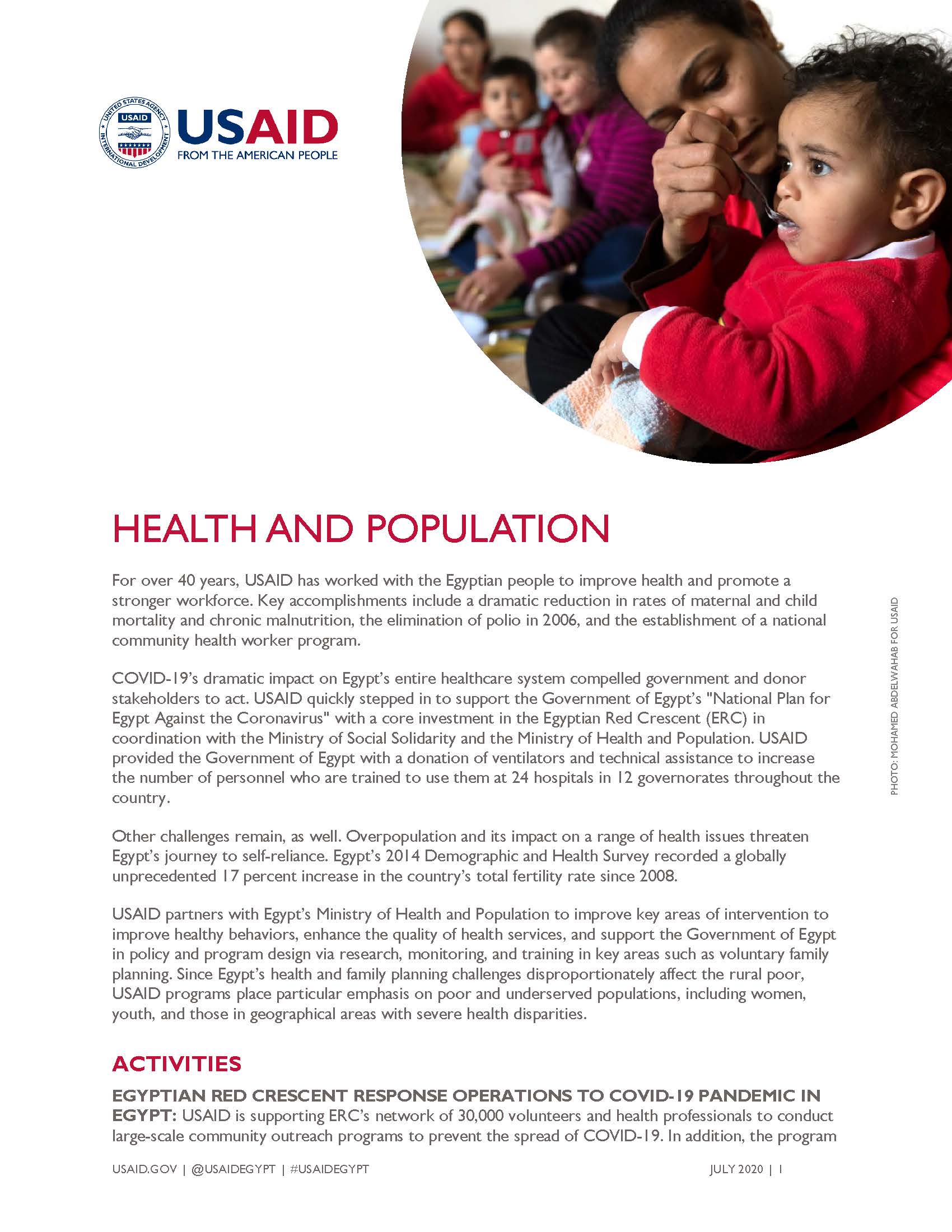Speeches Shim

Overview
For over 40 years, USAID has worked with the Egyptian people to improve health and promote a stronger workforce. Key accomplishments include a dramatic reduction in rates of maternal and child mortality and chronic malnutrition, the elimination of polio in 2006, and the establishment of a national community health worker program.
COVID-19’s dramatic impact on Egypt’s entire healthcare system compelled government and donor stakeholders to act. USAID quickly stepped in to support the Government of Egypt’s "National Plan for Egypt Against the Coronavirus" with a core investment in the Egyptian Red Crescent (ERC) in coordination with the Ministry of Social Solidarity and the Ministry of Health and Population. USAID provided the Government of Egypt with a donation of ventilators and technical assistance to increase the number of personnel who are trained to use them at 24 hospitals in 12 governorates throughout the country.
Other challenges remain, as well. Overpopulation and its impact on a range of health issues threaten Egypt’s journey to self-reliance. Egypt’s 2014 Demographic and Health Survey recorded a globally unprecedented 17 percent increase in the country’s total fertility rate since 2008.
USAID partners with Egypt’s Ministry of Health and Population to improve key areas of intervention to improve healthy behaviors, enhance the quality of health services, and support the Government of Egypt in policy and program design via research, monitoring, and training in key areas such as voluntary family planning. Since Egypt’s health and family planning challenges disproportionately affect the rural poor, USAID programs place particular emphasis on poor and underserved populations, including women, youth, and those in geographical areas with severe health disparities.
USAID/Egypt Fact Sheet: Global Health ![]() (pdf - 194k)
(pdf - 194k)
Activities
EGYPTIAN RED CRESCENT RESPONSE OPERATIONS TO COVID-19 PANDEMIC IN EGYPT: USAID is supporting ERC’s network of 30,000 volunteers and health professionals to conduct large-scale community outreach programs to prevent the spread of COVID-19. In addition, the program seeks to build ERC’s capacity to mobilize its volunteers and respond to future crises. With USAID assistance, ERC will distribute hygiene kits and supplement ERC’s mobile resource centers to expand awareness of safe hygiene practices and provide initial fever screenings. To ensure that volunteers are quickly sent where they are most needed, USAID is strengthening ERC’s coordination and communication capabilities through technical equipment upgrades. USAID is also assisting ERC to provide psycho-social support services to health workers so they can continue to effectively serve the Egyptian public. Implementing Partner: Egyptian Red Crescent; Life of Project: May 2020 – May 2021; Total Estimated Cost: $3.2 million; Governorates: Nationwide
FAMILY PLANNING THROUGH THE PRIVATE SECTOR: With approximately 1.3 million Egyptians born every six months, exponential population growth is one of Egypt’s greatest challenges. The Family Planning Through the Private Sector activity addresses the family planning and reproductive health needs of Egyptian youth by raising awareness of best practices and increasing access to voluntary family planning services. The activity focuses on two groups of young people as potential clients: male and female factory workers as well as youth with secondary or university education in urban areas. Peer educators in venues such as factories offer their colleagues one-on-one support and convene group activities to discuss family planning concepts and referrals. Implementing Partner: Population Council; Life of Project: October 2016 – September 2020; Total Estimated Cost: $4.7 million; Governorates: Port Said, Sohag
STRENGTHENING EGYPT’S FAMILY PLANNING PROGRAM: The Government of Egypt has identified population growth as one of the biggest challenges facing Egypt and has committed to strengthening family planning and reproductive health services. In an effort to stem the total fertility rate, USAID provides technical assistance and training for the Ministry of Health and Population staff to improve the quality of voluntary family planning services and information. Implementing Partner: John Snow, Inc.; Life of Project: December 2017 – December 2022; Total USAID Funding: $19.2 million; Governorates: Aswan, Assiut, Beni Suef, Fayoum, Giza, Luxor, Minya, Qena, Sohag, and in marginalized areas in Cairo and Alexandria.
AVIAN INFLUENZA PREVENTION AND CONTROL: Over the past 13 years, USAID has invested more than $40 million to support GOE efforts to prevent and control avian influenza. Support is currently provided through USAID’s Global Health Security and Development program, which seeks to reduce the risk of human exposure by reducing infections in poultry. Implementing Partner: Food and Agriculture Organization of the United Nations; Life of Project: February 2015 – December 2020; Total Estimated Cost: $6.2 million; Governorates: Conducted at a national level in partnership with the General Organization of Veterinary Services (GOVS)/Ministry of Agriculture and Land Reclamation



Comment
Make a general inquiry or suggest an improvement.